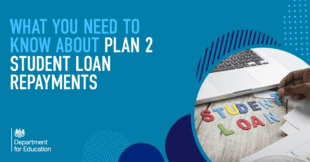What you need to know about Plan 2 student loan repayments

We are aware of some claims being made in the press about Plan 2 and Plan 3 student loan repayments following an increase in March’s Retail Price Index (RPI) figure. No decision has been made on the interest rate for these loans.
Here we tell you what you need to know.
What is the Retail Price Index (RPI)?
The RPI is a measure of inflation produced by the UK’s Office for National Statistics. The RPI has always been used for calculating interest on student loans.
What is a Plan 2 and Plan 3 student loan?
Plan 2 student loans includes anyone who took out a student loan for an undergraduate, Level 4/5, and/or PGCE course beginning on or after 1 September 2012, as well as Advanced Learner Loan borrowers. More details of the student loan plans can be found here: Repaying your student loan: Which repayment plan you’re on – GOV.UK (www.gov.uk)
Plan 3 loans are postgraduate loans.
How will the RPI announcement affect student loan interest rates?
The RPI is the measure of inflation that is used for calculating interest on student loans.
March’s RPI figure is used to set the interest rate for Plan 2 loan repayments from September 2022 onwards.
The interest rate on student loans has no impact on monthly repayments. These will not increase for students. Repayments are linked to income, not interest rates.
The new interest rate is applied from September and to protect borrowers the Government, by law, must cap maximum student loan rates to ensure the interest rate charged on the loan is in line with market rates for personal loans.
The announcement confirming the interest rates is made in August every year and ahead of this we will prepare for a range of scenarios including whether a cap is needed. The Government has not made a decision on what level student interest rates will be set at and will confirm this in the coming months.
Will this change in RPI make paying off my student loan unaffordable?
No. Monthly repayments for student loans are linked to income rather than interest rates or the amounts borrowed.
Student loans are different to personal loans and an increase in student loan interest rates will not increase monthly student loan repayments.
Interest rates only affect lifetime repayments for those who will repay their loans in full (or who come very close to doing so), principally high earners and/or those with small loan balances. Currently only 23% of borrowers who enter full-time higher education next year are forecast to repay their loans in full
This means that borrowers who earn below the relevant repayment threshold will continue to not have to make any repayments. Any outstanding balance is also written off at the end of the student loan term (or in case of death or disability) at no extra cost to the borrower.
The Institute for Fiscal Studies (IFS) has made clear that changes in interest rates have a limited long-term impact on repayments and the Office for Budget Responsibility predict that RPI will be below 3% in 2024.
If I am due to go to university in the next few years, will this change in RPI make it unaffordable?
No. It is important to be clear that student loans are not like commercial loans – repayments will be paused if you find yourself unemployed or if you salary drops below the threshold.
We announced in February that we will be reducing interest rates for new borrowers and so from 2023/24, new graduates will not, in real terms, repay more than they borrow. Alongside our wider reforms, this will help to make sure that students from all walks of life can continue to receive the highest-quality education from our world-leading higher education sector.
Read MoreWe are aware of some claims being made in the press about Plan 2 and Plan 3 student loan repayments following an increase in March’s Retail Price Index (RPI) figure. No decision has been made on the interest rate for …











Responses